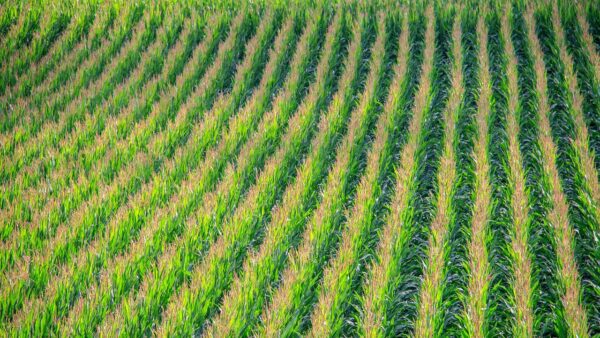
CSGA Award Winners
Robertson Associate Awards
Louis-Marie Gagnon took the helm of the family farm in 1966 after completing his business studies. The farm operation was diversified — from dairy to hay, grain and potato farming. Eventually, Gagnon exited dairy production and specialized in growing table potatoes. Locally marketed until 1984, Gagnon’s table potato crop was transformed into a certified, foundation and elite seed crop. For more than ten years, the farm produced greenhouse pre-elite seeds from cuttings. However, in 2008 potato production was abandoned.
In 1975, Gagnon started growing pedigreed seeds of barley, oats and wheat. In 1978, he added a processing centre to his farm. In the early ’90s he became a select grower.
His farm became a company in 1994 called Ferme Portageoise Inc. His son Jacques became the sixth generation of the Gagnon family to operate the farm. Since 2008, the farm produces approximately 400 acres of certified, registered, foundation and select seeds.
Robert (Bob) Hart has been involved in pedigreed seed production his entire farming career and served on the Ontario Seed Growers’ Association board for many years. Hart served as the OSGA president from 2003 to 2004 and as a national director for the Canadian Seed Growers’ Association from 2005 to 2009.
Hart established Agworks Inc., a seed processing business, in 1987. In 1995, Hart and six other Ontario seed producers formed PRO Seeds, a seed marketing and distribution company. Ten years ago, Agworks entered the food-grade soybean business and by 2010 was shipping 30,000 tonnes of non-GMO soybeans annually, all produced from certified seed.
In January of 2012, Agworks and PRO Seeds merged with Hendrick Seeds and Hendrick Agrifoods to form Sevita International, a company involved with all aspects of the soybean value chain.
Quentin Martin graduated from the University of Guelph with a bachelor of science in agriculture in 1981. Completion of his degree also coincided with the first pedigreed seed crop grown on the Martin family farm, Wintermar Farms, and the beginning of Cribit Seeds.
During the ’80s and ’90s, Cribit Seeds, then in partnership with First Line Seeds Ltd., was instrumental to the introduction of herbicide tolerant soybeans into Canada. Today, Cribit Seeds continues to be a production and processing facility for DEKALB brand soybeans.
In 2005, the Wintermar Grains brand was formed to distinguish food grain production and processing from existing seed enterprises and involves dehulling, roasting and flaking of oats, barley, soft wheat and rye.
Martin has served as president of the Ontario Seed Growers’ Association. He currently serves on the board of the North Waterloo Farmers Mutual Insurance Company and as chair of the board of directors for SeCan.
Robert Thériault grew up on a mixed farm in Drummond, N.B. After attaining a bachelor’s degree in business administration from the University of Moncton in 1967, Thériault explored various employment opportunities in business and education; however, he never lost sight of his real dream — farming. In 1976, he purchased a farm in Drummond where he produced potatoes and seed grain. By 1979, he was specializing in seed grain production, cleaning, grading and marketing.
Expansions through the ’80s and ’90s included the installation of seed grain storages, cleaning facilities, buildings and equipment. In 2003, his son Eric joined the operation, which led to the incorporation of Eastern Grains. Since then, Eastern Grains has continued its expansion adding more storage capacity, acquiring more farm land and increasing production capacity, while improving efficiencies and product quality.
Today, Eastern Grains Inc. is well known in the Maritimes, Maine and Quebec for its production, processing and marketing of quality seed grain and oilseeds.
Honorary Life Membership Awards
Robynne Anderson works in strategic development in the agri-food sector, working throughout the value chain. Founder and president of Emerging Ag Inc., she works internationally in the sector, including at the United Nations on agricultural development and the UN Committee on World Food Security. She has also been working on several intergovernmental organization processes including the declaration of the International Year of Pulses in 2016. Her volunteer work also includes a program in Zambia to teach orphans agricultural skills through schools.
Previously, Anderson established Issues Ink, a Canadian-based publishing company specializing in magazines on Canadian and American agriculture. She managed the company for over seventeen years until selling it in 2008. In that time, she founded Germination, reconceived the Alberta Seed Guide and purchased Seed World magazine. Having grown up on a seed farm, Anderson has worked on issues related to seed her entire career, including producing videos on seed such as “Smart from the Start.”
Claude Denis Caldwell, a native of Windsor, N.S., completed an honours bachelor degree in science, a master’s degree in eco-physiology and a PhD in biophysics. In 1980, he was appointed research scientist in cereals and oilseeds at Agriculture and Agri-Food Canada’s Research Station in Alberta.
Caldwell returned to Eastern Canada in 1983 for a teaching and research position at Nova Scotia Agricultural College. Here he provided leadership for cereals and oilseeds R&D in the Atlantic provinces while improving germplasm and management methods for wheat and barley.
Recently Caldwell has helped farmers here and abroad to diversify sustainable opportunities through projects in 10 countries. His cropping systems and agroecology research in China helped to reduce soil and water pollution in the city of Fuzhou.
Today, Caldwell continues his teaching, research and development work while taking on the role of associate dean academic of the faculty of agriculture, Dalhousie University.
In addition to receiving CSTA’s Honorary Life Award, Caldwell is also the recipient of the Clark-Newman-Clayton Award in recognition of his exceptional contribution to Canadian pedigreed seed production and agriculture through research, plant breeding or administration.
He has chosen Libiao Gao, a student studying comparative aspects of camelina and canola seed at Dalhousie University’s faculty of agriculture, to receive the $2,500 cash bursary for this award.
Bill Ingratta was raised on a vegetable and tobacco farm in southwestern Ontario. He received a bachelor of science in agriculture from the University of Guelph and a master’s degree in plant science from McGill University.
Ingratta started his career as the district manager of Maple Leaf Mills Ltd., seed division of southwestern Ontario, and was responsible for the purchase and sale of forage seeds as well as turfgrass and vegetable seeds.
From 1980 to 2008 Ingratta held various positions within the horticulture and field crop industries including horticultural crop advisor and director of the Crop Technology Branch for the Ontario Ministry of Agriculture and Food and head of the horticulture section at Kemptville College of Agricultural Technology.
In 2008, Ingratta retired from OMAFRA and formed WI-Link Consulting Inc. In his consulting role he has worked with the Vineland Research and Innovation Centre and the Ontario Sheep Marketing Agency.
Don McClure is a soybean product development scientist and the soybean research manager for Syngenta Canada. He grew up on a dairy farm in Halton County and completed a bachelor’s degree in resources management and a master’s degree in genetics and plant breeding from the University of Guelph.
The focus of McClure’s breeding program at Syngenta’s Arva, Ont., location has been early maturity conventional food grade soybean types for the Canadian market and glyphosate tolerant varieties for Canada and the United States. Several well-known varieties marketed by Syngenta Seeds have been released by the Arva research program managed by McClure.
Currently, McClure’s is working to develop even better conventional food grade varieties for Eastern Canada as well as early maturity glyphosate tolerant varieties for Western Canada.
McClure is the recipient of the CSTA and Germination’s 2009 Canadian Plant Breeding and Genetics Award.
Edward (Ted) Pratt was raised in Hartland, N.B., where his father managed the New Brunswick Seed Growers Co-op. Summer breaks from high school and college were spent employed at the Fredericton Research Station assisting on various crop experiments.
After obtaining a bachelor of science from Macdonald College in 1963, he taught agricultural subjects at the Vocational School in Woodstock, N.B., before joining the New Brunswick Department of Agriculture in Fredericton as a provincial weed specialist and extension officer for the blueberry sector.
Soon after earning a master of science from the University of Vermont, Pratt became head of the crop specialist section of the NBDA. In 1979, he was promoted to director of the plant industry branch, which provided specialized agronomy, horticulture and land services to the agricultural communities of New Brunswick. Before retiring in 2000, Pratt spent the last five years of his career as the NBDA’s assistant deputy minister.
CSTA Award Winners
CSTA Honorary Life Membership Award
Bob Pryce spent 38 years contributing to the seed industry, the seed trade and the Canadian Seed Trade Association. He began his work in the seed industry in the mid-’60s when he joined the seed corn project of Stewart Seeds. When Stewart Seeds was acquired by Ciba Geigy, Pryce rose through the ranks, becoming general manager for Canada. When Ciba Seeds became Novartis Seeds, he became the president of Novartis Seeds Canada. In turn, when Novartis Seeds became Syngenta Seeds, Pryce became its Canadian president. All that time, Pryce worked tirelessly to establish new corn hybrids in the United States and Canada and can be credited with the substantial growth of the Canadian corn seed trade.
Pryce was very active in the Canadian Seed Trade Association. He served on the board of directors from 2004 to 2007 and was a strong contributor to the CSTA Seed Corn Committee as vice-chair in 1994 and 1995 and as chair in 1996 and 1997. During this period, by achieving the exemption of corn from variety registration in April 1998, Pryce lead a significant effort to bring new varieties to Canadian producers in a timely manner. His work with corn producers, seed companies, regulators and politicians will be remembered as one of the most important contributions to the seed corn industry in Canada. In addition to these achievements, Pryce was instrumental in creating CSTA’s current Corn, Soybeans and Eastern Cereals Committee, reflecting the unique nature of the central and eastern Canadian seed industry.
Pryce retired from Syngenta in May 2008, but he hasn’t slowed down. He advised GreenLeaf Genetics for the following two years as an independent consultant and now, fully retired, Pryce continues to actively follow developments in Canadian corn and soybeans.
CSTA Seed Achievement Award
Sarah Foster is dedicated to improving seed quality and increasing opportunities for the Canadian seed industry. She is the president and senior seed analyst for 20/20 Seed Labs, which, for more than 22 years, has provided a wide variety of seed testing services for both growers and the seed trade.
Foster trained in seed testing at Cambridge University, Cambridge, England, before moving to Canada to begin work with a Canadian seed testing lab. In 1989, she started 20/20 Seed Labs, the first Canadian privately-owned and operated seed lab, beginning a significant series of firsts.
For instance, under Foster’s guidance, 20/20 Seed Labs was the first to develop a diagnostic profile for germination testing, the first to develop and implement client-specific canola vigour tests, and the first (and currently only) authorized private hybrid canola seed crop inspection service in Canada. Foster was also the first national president of the Commercial Seed Analysts Association of Canada.
Foster’s dedication to improvements in the seed industry extends to her commitment to developing the next generation of seed industry professionals. In 1991, 20/20 Seed Labs initiated a seed grader training program at Olds College, Olds, Alta., and in 2004 Foster received a Premier’s award for her work in that area.
Foster is qualified as a senior seed analyst by the Canadian Food Inspection Agency and the Commercial Seed Analysts Association of Canada. She is a seed grader, seed import release agent, licensed crop inspector and a registered seed technologist. She is also a member of the International Seed Testing Association and an honorary life member of the Canadian Seed Growers’ Association. In 2003, Foster was the winner of a GENEius Award and was also nominated for a Manning Innovation Award.











